Scotonomics
All Episodes
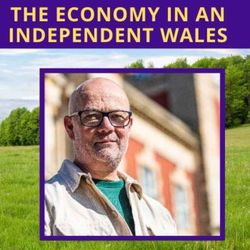
97. The economy in an independent Wales
54:40||Ep. 97Many voters in both Scotland and Wales seek to gain independence from the same Union. Progressive ideals underpin both independence movements, and both are social movements. But the similarities don't end there. Our economic position on day one of independence will be very similar.In both nations, there is a history of colonial conquest and resource extraction.By becoming independent, both movements aim to create a more prosperous, fair, and just society.Both nations are in desperate need of significant public expenditure, especially in transportation, telecommunications, housing stock, and infrastructure to support electrification.Both nations can be empowered by insights from Modern Monetary Theory (MMT) to become monetary independent governments, issuing their own currency on the day of independence.After independence, both governments have the potential to manage and regulate their own financial services sectors, which can be designed for public rather than profit purposes.And they face the same challenges. Including maintaining a strong relationship with their largest trading partner, England, withstanding price swings in international commodity markets, and building energy, food, and technological independence.On this episode, Kairin and I were joined by Mark Hooper, a Plaid Cymru councillor from Barry and a candidate for the 2026 Welsh Senedd.Link to the report mentioned in the interview.https://www.stuc.org.uk/news/news/offshore-and-onshore-wind-creates-one-job-in-a-million-according-to-new-analysis1/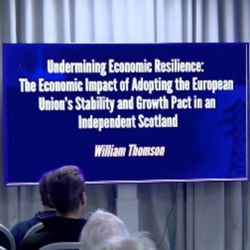
96. The Economic Impact of Adopting the EU's SGP in an Independent Scotland
26:15||Ep. 96Upon independence, the current Scottish government's plan risks undermining the very purpose of independence: the ability to design institutions tailored to Scotland’s needs.Assuming Scotland becomes independent within the next few years, it would likely take at least a decade before it could formally join the EU. Aligning institutions too readily with EU frameworks from the outset would mean forfeiting the flexibility to create institutions that serve Scotland’s best interests in the early years of independence. An independent Scotland requires fiscal flexibility, not self-imposed rules from a bloc it does not yet belong to.The Scottish Government argues that independence will allow Scotland to “tailor policy to Scotland’s needs; build greater equality and wellbeing; and become more resilient” (Scottish Government 2022, p. 6). We fully agree—this is the fundamental case for independence. An independent Scotland has all of the necessary resources, skills, and institutional capacity to enable its citizens to prosper.This paper, on which this presentation is based, demonstrates the value of rigorous, independent research into how economic choices, especially those made in the early years of independence, will influence Scotland’s long-term prosperity. We argue throughout the paper that, as part of the United Kingdom, Scotland’s economy is poorly served, but our principal concern is the current economic vision for independence as outlined by the Scottish government.Presentation delivered at the 2025 Scottish Currency Group conference. As such, there were slides that I refer to. So please visit: https://scotonomics.org/wp-content/uploads/2025/10/SUMMARY-What-Our-Paper-Means-for-Scotlands-Economy.pdf to download the summary report which includes Scotland's Sectoral Balances.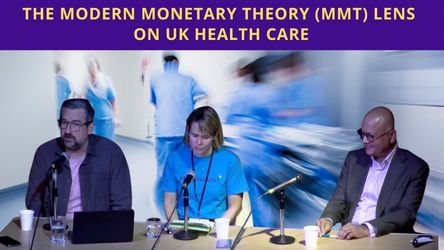
95. How does a Modern Monetary Theory (MMT) lens explain austerity in the NHS
01:01:12||Ep. 95Tackling health inequality in the UK: enabling people to live healthier lives, and rebuilding an NHS and care system that works for everyone. Considering how the MMT lens can empower NHS staff and the general public to demand more money for the UK's health services. A fantastic hour-long panel session.Presentation from the MML UK Anti-Austerity conference in Bristol. September 2025.Chaired by William Thomson, Political Economists, Scotonomics, alongside Dr. Jaideep Pandit (professor of Anaesthesia at the University of Oxford) and Emma Hughes (Just Treatment).Welcome to our panel on health and the NHS as we frame the choices made by staff and patients within the context of fiscal austerity. We will concentrate on fiscal austerity, which is the desire to reduce day-to-day spending on services like the NHS to reduce the government debt. This desire to shrink the government deficit by reducing services ensures that this can only be met by shrinking our net financial wealth. On top of fiscal austerity, there are two other forms of austerity that affect our wellbeing: Industrial and monetary austerity. Industrial austerity is structural. Our institutions are created and molded to ensure low wages, high unemployment, and de-industrialisation. By design, this leads to higher profits, the offshoring of negative environmental harm, precarious contracts, and hundreds of thousands of bullshit jobs. I am sure we will touch on this as we address low pay and conditions for many NHS staff. Finally, we have monetary austerity. Although we won’t cover this in the conversation coming up, I want to explain this form of austerity as it provides context for our talk this morning. Monetary austerity means generally high interest rates. The issue is magnified when interest is paid on reserves held by private banks at the Bank of England. Monetary austerity ensures that interest-bearing bonds (often inflation-linked - an idea that only sticks to borrowing from the wealthiest in society) represent a significant injection of purchasing power into the economy. Want to know how significant?Almost 160 billion pounds has been paid in interest on government borrowing in the last twelve months. All of this is paid as interest to the wealthiest in the country. That figure again in case you are still in shock, according to the ONS, is £160 billion. Why is this context important? Last year, the NHS budget in England was only 30 billion more! It was £188.5 billion.Now consider the debate and the discussions around the waste and unsustainability of NHS spending - money that literally improves wellbeing and saves lives - to the level of awareness around a very similar amount that is funnelled to those who have enough spare cash to secure, interest-guaranteed government liabilities. Where is the outrage? The calls for privatization? The Think Tanks analysing every £? Context is important. This huge sum (which is completely unnecessary) is never questioned. But every pound we spend on our NHS is scrutinised.The government could direct perhaps £100 billion a year to the NHS without increasing its debt. All it would have to do is to switch off interest on new government debt and add 50% to the NHS budget. It chooses not to do this. The MMT lens helps us understand why.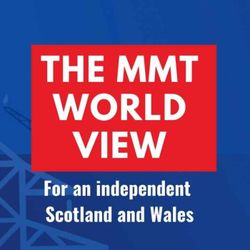
94. The MMT lens for an independent Scotland and Wales
42:50||Ep. 94In this episode of the scotonomics podcast, we take a live recording from a landmark presentation by Warren Mosler, the founder of Modern Monetary Theory, delivered in Cardiff. It was the first time he considered how his insights could be used to support the successful economic independence of both Scotland and Wales. In the audience were a former member of the Senedd Cymru and three prospective candidates who are very likely to be part of the 2026 intake. As ever, Warren challenges mainstream economic thinking. He explains how the standard mainstream economic narrative holds most governments hostage, based as it is on the economic understanding that has not shifted since the end of the gold standard - something that hasn’t been applicable for almost fifty years. Warren explains how the MMT lens would help policymakers understand the potential to expand the capacity of Wales and Scotland should they become independent and launch their own currency. Rigidly holding to gold standard thinking in a world of fiat money creation - where money is not linked to a fixed exchange rate or a commodity like gold - stymies progressive policies. With an up-to-date understanding, governments will be able to create a wellbeing economy based on full employment. Warren tackles six areas where the mainstream has things “backwards”. He focuses on trade, savings and investment, jobs, the money creation sequence, unemployment, and interest rates. He applies his MMT principles directly to the questions facing an independent Wales and Scotland, offering a fresh and radical perspective on how these nations could approach economic sovereignty.To conclude, Warren highlights the challenges faced by progressive administrations in Edinburgh and Wales. Warren says, “ you are up against people having things backwards. So, when you're trying to explain policy and what will work, what will be progressive, it's a significant obstacle. I just don't want you to underestimate the size of that obstacle.”Support our work. Join us on Patreon.https://www.patreon.com/ScotonomicsOr visit the website https://www.Scotonomics.org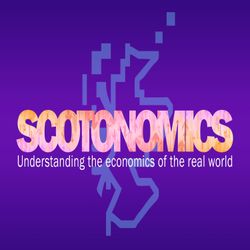
93. Explaining the Gig Economy in Scotland
52:15||Ep. 93In this episode of the Scotonomics podcast, we are joined by Caleen and Javier from The Workers’ Observatory. The platform and network were built to monitor the city of Edinburgh and observe how work is evolving in the capital, and to collectively challenge the conditions for self-employed and gig workers. We unpack what the gig economy really means, the types of jobs it encompasses, and how technology and platforms have transformed the way work is done. The conversation covers the limitations of traditional unions, the lived realities and precarious conditions faced by gig workers, and the broader implications for worker power and rights. We also discuss the role of data, the impact of government policy, and potential alternatives, such as cooperatives and job guarantees. As this was recorded live, we also answered a few great questions from our audience, highlighting the urgent need for systemic change in the world of platform-based work.https://workersobservatory.orghttps://www.patreon.com/Scotonomics
92. The 'real' impact of central banks on the 'real' economy
01:07:56||Ep. 92Associate Professor Shireen Morris has long been concerned about the power of unelected central bankers. She has always questioned their supposed neutrality. In his brilliant paper on Central Banks (link below), she suggests that, “Theories of ‘monetary policy neutrality’ have facilitated inaction and atrophy of the Government’s power over monetary policy."Her research instinct came back online when the Australian Government in 2024 proposed removing Parliament’s veto over the Central Bank. Should we really have one of the most important institutions completely outside of democratic control? In this brilliant conversation, we take a step back to question the role of all central banks properly. Why do they all have a mandate on price stability? Can they control inflation? Why and how have they gained so much power and influence over our economy and society? We also consider where independence starts and ends. Finally, we take a step into the future. Using an independent Scotland as a test case, how would William and Shireen co-design a brand new Scottish Central Bank?Link to Shireen's paper:Against Increased Central Bank Independence in Australia: Better Balancing the Unelected Authority to Decide Big Distributional Trade-offs with Principles of Constitutional Democracyhttps://papers.ssrn.com/sol3/papers.cfm?abstract_id=5083556
91. The MMT lens and the climate crisis
08:38||Ep. 91James Meadway recently argued that Modern Monetary Theory (MMT) offers nothing to help us understand or respond to the climate crisis. This is a bold claim, particularly considering the growing number of progressive economists who find it valuable. Does a modern school of economic theory truly ignore one of humanity’s greatest challenges? Of course not.James’s criticisms were detailed on his Macrodose podcast.https://podcasts.apple.com/gb/podcast...James claims that MMT has nothing to say about the climate crisis. However, a closer look reveals that this simply isn’t true. If James can’t see the connection between MMT and the climate crisis, it is only because he has stopped looking.James Meadway’s dismissal of MMT overlooks its substantial contributions to understanding and addressing the climate crisis. From reshaping fiscal policy to empowering governments, MMT offers a robust framework for progressive climate action. It should not be hastily rejected by faking to consider how the discipline has evolved. Those engaged in the economics of the climate crisis should explore its potential to drive meaningful change.
90. Zack Polanski and Progressive Economic Ideas. In conversation with Scotonomics
49:40||Ep. 90Zack Polanski is running to be the leader of the Green Party. He is currently deputy leader and a member of the Green Party London Assembly. In this LIVE Q&A interview. We cover many topics that connect Zack's views on our economy with the work of Scotonomics. These include:The importance of understanding planetary boundaries and the finite planetary resourcesgreen/sustainable growthThe current economic paradigm nd the impact on UK-wide policiesThe undemocratic nature of the UK stateThe usefulness of the MMT lensThe always and forever negative impact of austerityZack Polanski is standing for election as the leader of the Green Party in England, and this is a brilliant overview of his progressive economic ideas.
89. The Self Financing State - How the UK government creates and spends new currency
44:02||Ep. 89In late 2022, a group of researchers published a working paper which would transform the understanding of how the UK government is financed."The Self-Financing State" with Co-Author Andrew – A Deep Dive into the UK’s Public Finance OperationsIn this revealing interview, we’re joined by Andrew, co-author of The Self-Financing State—a paper that lays bare how UK public finance actually operates, based on institutional, legal, and operational evidence. In five key parts, we break down the research and explain why this is one of the most important economic papers published in the UK in decades.1. Government Spending = Money CreationWe kick off by exploring the central insight of the paper: UK government spending creates new money. It is not funded by taxes or borrowing. Andrew explains how this is embedded in legislation, with the Consolidated Fund at the centre of operations. The Treasury spends first—taxes and bond sales happen later and serve different purposes.2. Bonds Don't Fund SpendingThe paper shows that bonds are not issued to raise money, but to support monetary policy and the financial system. Andrew details the Full Funding Rule, the role of gilts and Treasury bills, and how the shift to interest-on-reserves post-QE makes debt issuance largely obsolete from a funding perspective.3. The Bank of England Is Not IndependentAlthough the Bank of England is said to be independent, the paper shows that it is functionally subordinate to the Treasury in all spending operations. From QE indemnities to the Ways and Means facility, the central bank acts as a tool of the state. Independence is limited, mostly rhetorical, and undermines democratic accountability.4. Misleading Framing of Deficits and DebtWe tackle the myth that government must "live within its means." Andrew explains how deficits are not under direct government control, but result from private sector saving and economic activity. Austerity, then, is not necessary—it’s a political choice sold as an economic imperative.5. Public Debt = Private WealthFinally, we reframe government debt as a form of safe public saving. Bonds are demanded by pension funds and institutions because they are secure and state-backed. The idea that the national debt is something to “pay down” ignores its function as the backbone of private financial security.Why this mattersThis episode is essential listening for anyone who wants to understand how money actually works in the UK. If you care about the economy, public services, or Scottish independence, this is not just theory—it’s the real-world plumbing of the financial system. And it’s time more people knew about it.🎧 Listen nowA link to the fascinating paper: https://www.ucl.ac.uk/bartlett/sites/bartlett/files/the_self-financing_state_an_institutional_analysis_of_government_expenditure_revenue_collection_and_debt_issuance_operations_in_the_united_kingdom.pdf
loading...